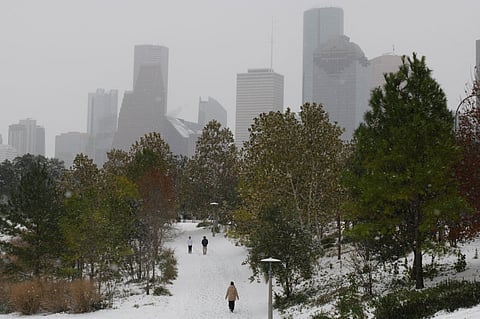Winter's frozen grip: A planet's cry for help
Will we wait for the next disaster to see this is no longer a generation’s issue?

It feels surreal, almost like a scene from a movie. The Gulf Coast — known for sweltering summers and tropical storms — is buried under historic amounts of snow. Roads are impassable, schools are closed, airports are silent, and states like Louisiana, Georgia, and Florida are in states of emergency.
At least nine lives have been lost, and millions across the South are bracing against an unforgiving freeze. Temperatures in parts of the US are running 20 to 30 degrees below average — a winter wonderland turned deadly. But there’s a bigger story unfolding here, one we cannot afford to ignore.
This isn’t just a fluke or a freak weather event. It’s the planet speaking, loudly and urgently. And if we listen closely, we’ll hear the echoes of other warnings from recent years.
Think back to Texas in 2021. Millions were plunged into darkness and cold when a brutal storm overwhelmed an unprepared power grid. Or the catastrophic floods in Pakistan in 2022, where a third of the country lay underwater, displacing millions and claiming over a thousand lives. Or Europe’s scorching summer in 2023, when relentless wildfires and unrelenting heat turned dreams of a Mediterranean escape into nightmares.
These are not isolated incidents; they’re pieces of a puzzle that scientists have been trying to solve for decades. The conclusion is clear: global warming doesn’t just make the world hotter. It makes it wilder.
Here’s how it works. Rising temperatures disrupt the jet stream — a powerful river of wind high above us that directs weather systems. When the jet stream wobbles, Arctic air escapes south, bringing bone-chilling cold to places like Alabama and Florida. At the same time, trapped heat causes unbearable summers elsewhere. The Gulf Coast’s snowstorm is just another chapter in this unfolding story of chaos.
The tragedy isn’t just the weather — it’s how unprepared we are for it. Homes built to stay cool in summer struggle to keep people warm in a freeze. Communities without resources are left scrambling. And those who are already vulnerable — older adults, children, low-income families — bear the brunt of these so-called anomalies.
But here’s the most chilling part: this might not be a one-off. If we don’t act, these kinds of disasters will only become more frequent, more intense, and more deadly.
We need to stop treating climate change like an abstract future problem and see it for what it is: a present and growing emergency. Governments must invest in resilient infrastructure that can withstand extremes. Businesses must cut emissions and innovate for a sustainable future. And all of us need to push for change — whether it’s reducing our carbon footprints, holding leaders accountable, or supporting policies that prioritise the planet.
This storm isn’t just about the South, or even just about the US. It’s about all of us, living on a planet that’s running out of time. The Gulf Coast may be snow-covered today, but the writing is on the wall.
Will we read it? Will we act? Or will we wait until the next “once-in-a-generation” disaster to remind us that this is no longer a generation’s problem, but humanity’s?
Ahmad Nazir is a UAE based freelance writer, with a degree in education from the Université de Montpellier in Southern France



